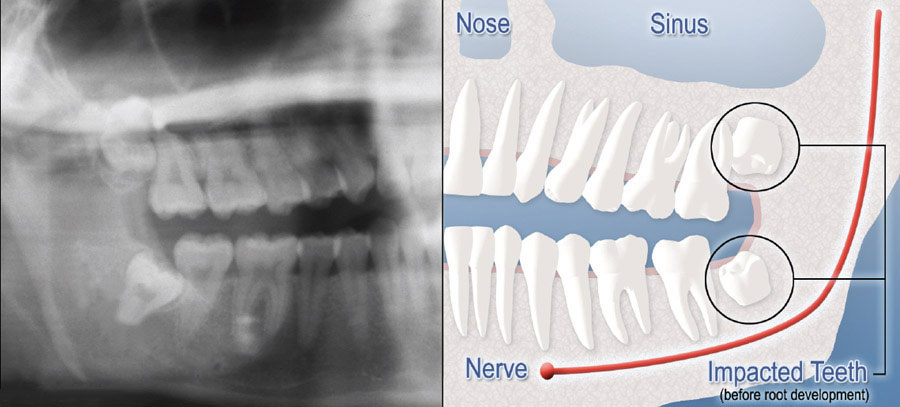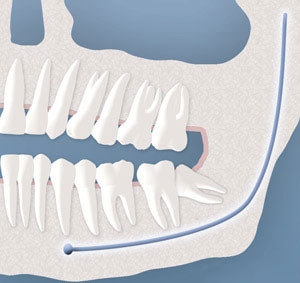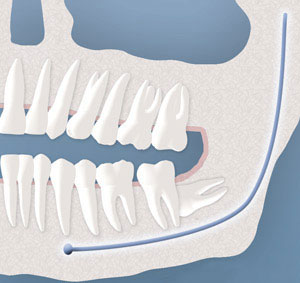Impacted Wisdom Teeth
What is an impacted tooth?
Although most people develop and grow 32 permanent adult teeth, many times their jaws are too small to accommodate the four wisdom teeth. When inadequate space prevents the teeth from erupting they are called impacted wisdom teeth. This indicates their inability to erupt into the proper position for chewing and cleaning.

Types Of Impactions
We will need to see you for a consultation to determine if you will benefit from wisdom tooth removal. A special x-ray of your mouth and jaws (panorex) will be taken to determine if your wisdom teeth are impacted, if there is room for them to erupt, and how difficult it will be to have them removed.
- Soft Tissue Impaction: There is not enough room to allow the gum tissue to retract for adequate cleaning of the tooth.
- Partial Bony Impaction: There is enough space to allow the wisdom tooth to partially erupt. However, the tooth cannot function properly in the chewing process, and creates cleaning problems, among others.
- Complete Bony Impaction: There is NO space for the tooth to erupt. It remains embedded in the jaw bone or if even partially visible requires complex surgical techniques for removal.The impacted wisdom tooth may also be in an unusual position and difficult to remove. This situation can also arise when the shape or size of the jaw bone and other facial structures make removal of this tooth significantly more complex.



Frequently Asked Questions
How do I know if my wisdom teeth are impacted?
Common signs of impacted wisdom teeth include pain or tenderness in the back of your mouth, swelling around the jaw, difficulty opening your mouth, and persistent bad breath. However, many impacted wisdom teeth cause no immediate symptoms. A panoramic X-ray during your consultation with Dr. Johnson reveals the position of your wisdom teeth, available space for eruption, and whether they’re impacted. Regular dental examinations help detect impaction early, allowing for proactive treatment planning.
What's the difference between soft tissue and bony impaction?
Soft tissue impaction occurs when the wisdom tooth has sufficient bone space but cannot fully emerge through the gum tissue, making proper cleaning impossible. Partial bony impaction means the tooth has partially erupted but remains partially covered by bone, preventing normal function and creating hygiene challenges. Complete bony impaction is the most complex, where the tooth remains entirely embedded in the jawbone with no space to erupt, requiring advanced surgical techniques and sedation dentistry for comfortable removal.
At what age should impacted wisdom teeth be removed?
The ideal time for wisdom teeth removal is typically between ages seventeen and twenty-five, when roots are not fully developed and bone is less dense, facilitating easier removal and faster healing. However, impacted wisdom teeth can be successfully removed at any age.
What happens if I don't remove my impacted wisdom teeth?
Leaving impacted wisdom teeth untreated can lead to serious complications including infections, cysts or tumors in the jawbone, damage to adjacent teeth, crowding of other teeth, and gum disease. Partially erupted wisdom teeth create pockets where bacteria accumulate, causing recurring infections and decay. The pressure from impacted teeth may damage neighboring molars’ roots or cause bone loss. Early removal prevents these complications and protects your long-term oral health and investment in orthodontic treatment.
Can I have all four wisdom teeth removed at once?
Yes, removing all four wisdom teeth in a single appointment is common and often recommended. This approach minimizes your overall recovery time, reduces the number of procedures and anesthesia exposures, and allows you to complete treatment in one visit rather than multiple appointments with a streamlined recovery process.